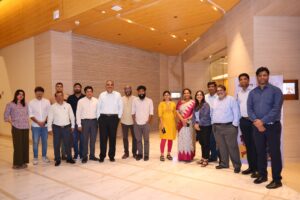India has a population of more than a billion people. However, only 70 million people have access to some form of credit, despite a tremendous need for credit among the larger Indian population. The credit penetration in India is much lower as compared to the Western markets – largely due to the lack of financial data which helps banks assess customers’ creditworthiness.
Many fintech companies have now emerged to provide unsecured credit lines to meet the needs of millions of Indians. However, unsecured credit remains expensive and the lines are smaller due to the inherent credit risk. Enabling credit for the next billion will require major innovation, driven by product and technology in the next decade.
While most Indians don’t have rich data, 95 percent of their wealth resides in some form of physical assets like gold. Gold has been an integral part of Indian households. Indians inherit, buy and hold gold for financial security, social status, and is a part of their cultural values. Around 300 million people in India hold more than $1 trillion worth of gold.
Due to the emotional value associated with gold, people rarely sell their jewellery. Instead, they pledge their jewellery as collateral to get short-term secured loans to meet their financial needs. Many of them are small and medium-sized business owners such as kirana stores, farmers, fruits and vegetable vendors, traders who frequently need access to working capital due to fluctuations in incoming cash flow.
Also, there are individual households who need access to money for their other financial needs such as education, medical bills or buying appliances and vehicles to upgrade their lifestyle.
The majority of the people see a loan against gold as a rainy-day solution. They have a fear of losing their gold because of how the industry has traditionally operated due to lack of transparency, predatory practices and steep interest rates, leading to gold getting auctioned.
Gold lending has not seen any product-led innovation in decades. This has led to most Indians being deprived of the credit they need despite holding large amounts of gold. It’s time for us to bring product innovations to monetise India’s gold to drive financial inclusion for all.
As a digital lending platform, we have dealt with lakhs of customers who have taken gold loans from us. Many of our customers have also told us they don’t know exactly when they need a loan. This results in a lot of emotional stress for customers at the time of getting a gold loan as the interest on the loan starts as soon as the loan is approved even if they don’t use that money immediately.
There is a need to innovate and build multiple products. Imagine you can offer a host of services to customers ranging from keeping their gold safely in a locker to offering multiple credit products such as overdraft, credit card, and pay later backed by the same gold stored in the locker as collateral.
People need not worry about the safety of their gold. They can use the credit to upgrade their lifestyle while being in control of how much credit they want to consume to avoid any risk of default. What if they start earning interest on this gold sitting in the locker. Imagine them getting a host of rewards such as earning more gold on their spends, special schemes from nearby jewellers to buy more gold, discounts at their favourite merchant stores and more.
Top this off with self-serve kiosks placed across the country where people can drop or pick up their gold when they need more credit or want to wear jewellery for a festive occasion. Suddenly, storing gold at home becomes a lot less rewarding.
Recent technology advances in the area of data science, hardware, IoT, image processing has made it possible for us to do gold appraisal, transport, storage, and credit underwriting at scale and support product innovation in this space.
(Disclaimer: The views and opinions expressed in this article are those of the author and do not necessarily reflect the views of YourStory.)










